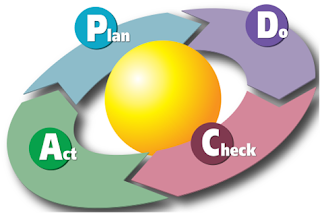"Humans are very proud of their changes, but every imagined transformation turns out to be a new set of excuses for behaving exactly as the individual has always behaved" - Xenocide (The Ender Quintet 3, p36)
Continuous change is the process to facilitate continuous improvement. Improvement can only be achieved by experimenting and failing until there is success. Within lean this is known as plan-do-check-act. We think of new ways to do something, then we try them, we see the results of what we have done and we adjust.
For children this is standard behaviour, somewhere down the line this ability seems to get lost. We grow rigid and conservative when we age. We learn to do things a certain way, no questions asked. How many times didn't one hear: "We have done it like this as long as I can rememeber, why change now?". Perhaps the process is perfect, but it is never wrong to think about it and trying to improve. Only the people who ask questions about what is or what isn't discover new ways of doing things. The people that don't as questions will never grow, never gain new insights and never improve.
Somewhere deep inside most adults the child still lives on, give an adult some lego bricks or a a colouring page and they will be playfull. Only by becomming playfull we can open our minds and think about what we are doing and where we can improve. There are no stupid changes, all changes contribute to a better understanding of how stuff works. Sometimes stupid is good, we learn how not to do something and perhaps we gain insight for the next step to take.
To improve we need to give ourselves time to experiment, small controlled experiments. Change just a little in the product, the process or our lives. Observe and check what the change does and decide to keep the change or revert to the old ways. Some say that we need to change just one percent of what we do each day. The sum will be a remarkable change and hopefully an improvement over a year.
Monday, 27 August 2018
Tuesday, 14 August 2018
Forbes: What is Agile?
According to this article on Forbes the Agile Manifesto is an historical but outdated document now Agile is no longer only a software development approach but an organizational one. It has become about delighting customers, descaling work, enterprise-wide agility and nurturing culture. Those four principles are easier to understand and remember than the original row of principles in the manifesto. This does not make the manifesto useless, it promotes it to the mindset we need in order to be(come) Agile.
Subscribe to:
Posts (Atom)
